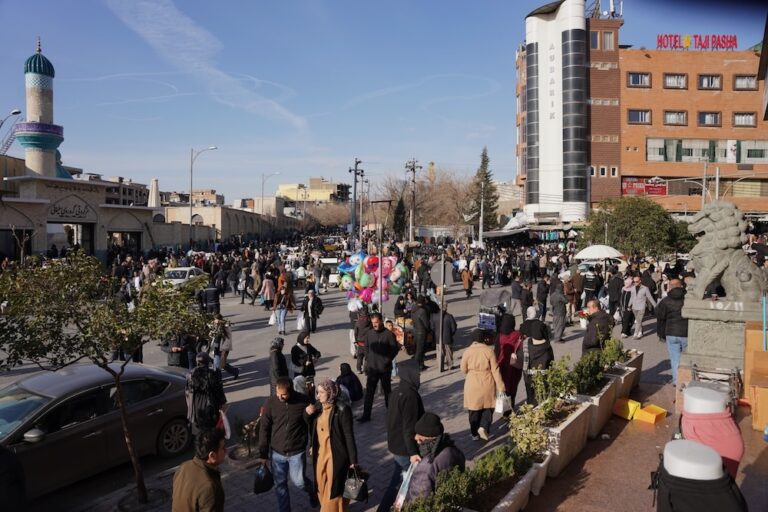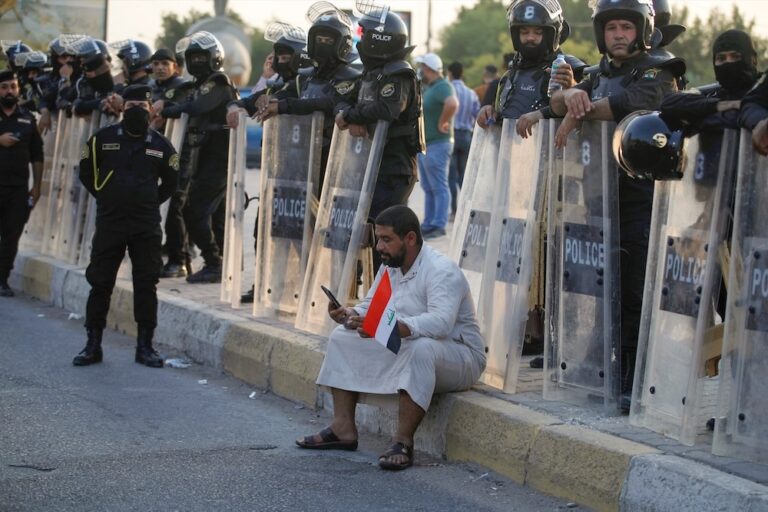Two groups who organized concurrent demonstrations in Baghdad calling for the cancellation of parliamentarians' pensions applied to the Interior Ministry for permits on 21 August 2013, as required by Iraqi law. On 22 August, Interior Ministry officials refused to issue them permits, without providing them a reason.
Iraqi authorities should legitimately explain why it is necessary to ban demonstrations planned for August 31, or allow them to proceed, Human Rights Watch said today. They should ensure organizers are able to appeal any ban.
Two groups who organized concurrent demonstrations in Baghdad calling for the cancellation of parliamentarians’ pensions applied to the Interior Ministry for permits on August 21, 2013, as required by Iraqi law. On August 22, Interior Ministry officials refused to issue them permits, without providing them a reason. Organizers of both demonstrations expect them to go ahead, but told Human Rights Watch that they are concerned that Iraqi security forces will use force to block what they said would be peaceful demonstrations, and may arrest and intimidate organizers should the planned demonstrations take place.
“It’s ironic that officials suggest that using force to block peaceful demonstrations will assist Iraq’s ‘march to democracy’,” said Joe Stork, acting Middle East director at Human Rights Watch. “The authorities can ban demonstrations if they believe they will be violent, but here the concern seems that protests will be politically embarrassing or inconvenient.”
In a statement published on its website on August 27, the Interior Ministry said that “security challenges and traffic problems require us to delay the demonstrations” of August 31. Citing “consideration of the risks of terrorism by al-Qaeda and Ba’athists… and of weakening the authority of the state, compounded by regional agendas that seek to weaken Iraq for their own interests,” and its determination to “challenge all negative phenomena that stand in the way of the march of democracy,” the statement said security forces would “firmly confront those who disrupt the security of the country and of its citizens.”
The UN’s first special rapporteur on the rights to freedom of peaceful assembly and of association, Maina Kiai, emphasized in a May 2012 report that states may only restrict the right to peaceful assembly where there is a “pressing social need.” The report stressed that states should not need to ban peaceful gatherings in order to fight terrorism effectively, and said “the free flow of traffic should not automatically take precedence over freedom of peaceful assembly.” Kiai places responsibility on authorities to provide assembly organizers with “timely and fulsome reasons” for any ban, and the possibility of a swift appeal.
The Interior Ministry’s reasons for blocking the August 31 protests clearly fall far short of these recommendations, Human Rights Watch said.
Human Rights Watch spoke to three organizers of the demonstrations, one planned for Firdos Square and the other for Tahrir Square, both in central Baghdad, and viewed the permit request they submitted to the Baghdad police on August 21. The organizers all said that officials in the Baghdad police unit responsible for police deployments in central Baghdad told them on August 22 that their permit requests were denied, but refused to give reasons or provide them with a copy of the denial order.
One organizer of the Tahrir Square demonstration told Human Rights Watch that ministry officials asked him to confirm his home address after he submitted the request, which he interpreted as an attempt to intimidate him. Two organizers of the planned Firdos Square demonstration told Human Rights Watch that officials of the central Baghdad police unit informed them that an “executive manager” had written the word “refused” on their permit request. A third organizer said officials in the same police unit told him that the acting interior minister, Adnan al-Assadi, had personally vetoed the request.
Hamid Jahijh, a member of the organizing committee of the National Campaign to Cancel Parliament Members’ Pensions, told Human Rights Watch that protest organizers expect up to 10,000 people to gather on August 31 in the two Baghdad squares despite the Interior Ministry’s refusal to grant permits. “Constitutionally, we have a right to demonstrate,” Jahijh said, but expressed fears that the security forces “might get violent with us” and arrest the organizers and others.
Iraqi law does not clearly state what authority regulates demonstrations, including granting permits. The Baghdad provincial council is authorized to issue permits for demonstrations in Baghdad under regulations that the previous governor issued in 2011. However, Baghdad’s new governor, Ali Tamimi, and the interior ministry spokesperson, Saad Maan, recently said the ministry is now responsible for rejecting or accepting permit applications. Maan told Human Rights Watch on August 16 that only the ministry can issue permits for demonstrations but declined to explain why or when it acquired this authority.
Tamimi, who belongs to the opposition Sadrist movement, told local news outlet al-Mada Press that the provincial council’s authority to issue or withhold demonstration permits was “taken away” during his predecessor’s tenure. He criticized the Interior Ministry for blocking protests, saying: “No one has authority to ban these demonstrations since it is a constitutional right.”
Iraqi authorities need to change the laws governing demonstrations in Baghdad and elsewhere, so that demonstrations are in principle permitted and so that organizers need only notify the authorities of planned demonstrations, not request permission. The onus should be on the authorities to justify banning any demonstration, with the organizers having a full right of appeal.
The August 22 permit denials appear to be part of an ongoing campaign by the Interior Ministry to undermine the right to freedom of assembly and to stifle antigovernment protest. On July 19, officers from the federal police’s intelligence unit arrested Jaafer Abdelamir Mohammed, a journalist, for “protesting without an official permit” when he and three other men stood peacefully in Tahrir Square holding up banners critical of the government.
On August 2, security forces detained 13 people who attempted to gather peacefully to draw attention to worsening security conditions and official corruption. Police charged 10 with “disobeying police orders,” a criminal offense, for having failed to obtain a permit in advance, and military officers detained the 3 others for nearly 36 hours before releasing them without charge.
As a state party to the International Covenant on Civil and Political Rights (ICCPR), Iraq is obligated to protect and promote the rights to freedom of expression, association, and peaceful assembly. According to the ICCPR, authorities may only restrict the right to assembly in exceptional and narrowly drawn circumstances. Restrictions are permissible only when they are based in law and “necessary in a democratic society” to safeguard “national security or public safety, public order (ordre public), the protection of public health or morals or the protection of the rights and freedoms of others.”
Iraq’s granting of over-broad approval authority to government officials breaches the narrow criteria that international law prescribes for curtailing the right to assembly. It also violates article 38 of Iraq’s constitution, which guarantees the right to “freedom of assembly and peaceful demonstration.”
“The authorities seem more concerned with preventing Iraqis from peacefully expressing their opinions than protecting them from the attacks that have killed and injured so many this year,” Stork said. “Security forces and officials should protect peaceful demonstrators and provide them a safe space to protest, not intimidate people into silence.”


